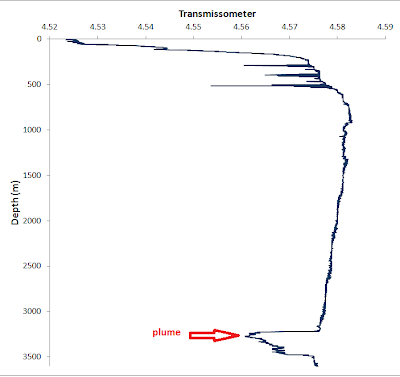 |
| Relative amount of particles in the water over the Mid-Atlantic Ridge |
|
We just finished a station over the Mid-Atlantic Ridge, a huge plate boundary that runs down the middle of the Atlantic ocean as a long underwater mountain range. Some parts of this mountain range are more than 3000m (about 9000 ft) higher than the surrounding ocean floor. This is only slightly lower than Mt. Whitney in California. This huge mountain range under the sea is a divergent plate boundary, or an area of the Earth's crust where two plates are moving apart from one another. In this case, the Mid-Atlantic Ridge forms the boundary between the North American Plate and the Eurasian Plate. The plates are moving apart at about 2 cm/yr. When the plates move apart, lava and other chemicals are emitted into the water that we can measure. Once the lava hits the seawater, it rapidly cools off since the seawater is colder than the lava, and looks like black smoke when it comes out of the vents. Due to this, these underwater volcanoes are often called "black smokers." Black smokers are interesting for a group of scientists studying metals, because some of these metals are emitted in extremely high concentrations near these hydrothermal vents, or underwater volcanoes. Some of the metals that were found in high concentrations at this sight were iron, and mercury. In order to sample in the plume from the ridge, we first put some sensors into the water, including one that can measure the relative amount of particles in the water at different depths. This is called a transmissometer, and where the measurements rapidly decrease (due to an increase in particles), is generally where the plume should be. We therefore collected samples in the plume, as well as directly above and below it for comparison. We also got our instrument a little too close for comfort to the bottom of the ocean at this station, and had a little bit of a scare that we might have damaged our equipment, but all was well when it came back on board (phew!).


No comments:
Post a Comment